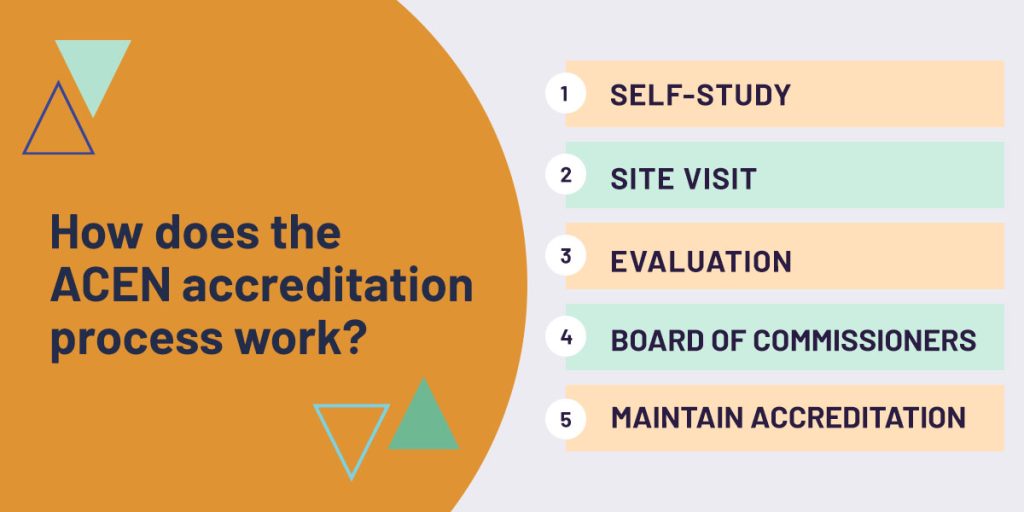Accreditation is the foundation of many higher education programs. Nursing, in particular, must be held to the highest standards, as graduates from these programs directly impact people’s lives. Only ACEN-accredited programs have received certification to show that they meet the rigorous education standards required for health care careers. The 3.175 million nurses in the U.S. graduated from accredited programs that helped them find meaningful jobs.
As a leading accrediting body, ACEN sets comprehensive standards and criteria for nursing education programs. While accreditation is essential for higher education institutions, the process can be challenging. Streamlining your preparation and having a detailed strategy are critical to achieving your accreditation goals.
ACEN accreditation shows that your institution upholds the highest standards in nursing education. The U.S. Department of Education sets these high standards. They aim to ensure that every licensed practice nurse (LPN), registered nurse (RN), and advanced practice registered nurse (APRN) is prepared to meet their profession’s demands. Accreditation offers significant benefits for institutions offering nursing programs:
ACEN accreditation standards require review every five years. ACEN published the latest version of the standard in 2023. It established the eligibility criteria and parameters ACEN considered before awarding accreditation within the framework of their five standards:
Your nursing program’s mission and philosophy must align with ACEN’s mission, goals, and values. These goals include ensuring effective program delivery and achieving student learning outcomes. Key criteria for this standard include:
Faculty in the nursing program must have the necessary education and experience for their roles to ensure they support student learning outcomes. Your nursing program faculty must also have up to date expertise in teaching, assessment methods, and the principles of diversity. They must have clearly defined responsibilities and adopt a posture of ongoing learning.
Your nursing program must prioritize student policies and services to boost student achievement. Your accreditation status must be current and accessible. Key policies — like admissions, progression, graduation, and how to file complaints, must be public, current and fair. If there’s ever an issue, students should be able to expect a straightforward process for resolving complaints with due process.
Your curriculum must help students achieve their academic goals and master core competencies while ensuring safe practices in today’s health care landscape. It must feature unified student learning outcomes based on professional nursing standards. You must organize your courses to guide students through their journey so each step builds on the previous one.
Your nursing program assessment must evaluate student learning and program outcomes through a systematic plan for evaluation (SPE). Faculty should create and implement the SPE to assess student learning outcomes and role-specific competencies. The SPE includes regularly assessing student learning, program completion rates, licensure and certification exam pass rates, and job placement rates.
Your institution must take the following steps to gain ACEN accreditation for your nursing education programs:

ACEN accreditation is understandably comprehensive. In maintaining stringent standards and criteria for accreditation, ACEN ensures that nursing programs prepare students for their careers. It fosters continuous improvement at accredited institutions — a vital element of student success. Some tips and tricks for obtaining ACEN accreditation include:

Accreditation can be challenging, especially if you scramble to collect documentation at the last minute. Develop a sound strategy for approaching education using your past and current data. With data-driven insights, you can identify and address improvement opportunities in plenty of time. You don’t have to get ready when accreditation day comes around — you’ll be ready.
Watermark’s accreditation readiness solutions streamline, simplify, and enhance accreditation and reporting. Our Educational Impact Suite (EIS) gathers and synthesizes your programmatic data into actionable insights and reports. Based on the findings, you can collaborate with your team and develop an action plan for meeting ACEN assessment criteria. Request a demo and streamline your ACEN accreditation process today!